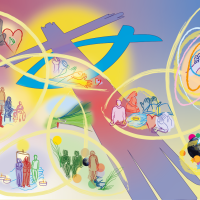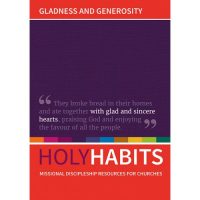Reflection by Revd Dr Elizabeth Welch
I can remember speaking at an ecumenical conference some years ago and mentioning the Trinity. During the question time a Methodist minister commented ‘oh that’s the Sunday Methodist ministers have off and the service is left to the lay preachers.’
Well I was pretty impressed that Methodist lay preachers have a better grasp of the Trinity than Methodist ministers!
There are times when people will suggest that the Trinity is an obscure doctrine which we’re better without, in order to have simplicity in the Christian faith.
But the Trinity is more than a doctrine, it’s a way of seeing God – and seeing God in all God’s richness and diversity and mystery. The doctrine, or understanding, of the Trinity arose out of the way in which God was perceived to be revealed and experienced.
1stly, there was the Creator God who brought all life into being, the God we read about at the beginning of Genesis, the God who is sovereign and yet who has placed responsibility for the earth in human hands. It’s this same God whom Jesus knew in his boyhood and ministry in a close personal relationship as Father.
2ndly, there was the incarnate God, Jesus the Son, who shared our human life, in all its frailty and vulnerability and fragility, even to the point of death itself. And then he was raised from the dead for the life of the world.
3rdly, running through the history of the people of God, there is the life-giving Spirit. This Spirit breathed over the waters of creation at the beginning of time, hovered over Jesus at his baptism, was poured out on the people of God at Pentecost. The Spirit – as wild as wind and fire and as gentle as a dove, opens us up to understand one another in different languages.
The Trinity reminds us of the different faces of God, yet the way in which these are held together in the one God.
The readings we heard today from Matthew and Corinthians show the way in which this three-fold understanding of God quickly became a part of the understanding of God held in the early church.
In Matthew, Jesus, after the resurrection, commissions the disciples to baptise all nations – ‘in the name of the Father and the Son and the Holy Spirit’.
At the end of the 2nd letter to the Corinthians, Paul concludes with the verse that has become a well-known prayer ‘the grace of the Lord Jesus Christ, the love of God and the communion of the Holy Spirit be with all of you.’
There might not have been a worked out understanding at those times about the inter-relationships between the three faces of God, but there was a clear sense of God’s presence in the world in three radically different ways.
If we look at the life of the church and the people of faith across the long perspective of two millennia, we can see that people over the centuries have put different emphases on varying aspects of faith.
For some it has been the natural world that has spoken most profoundly of the Creator God. The current concern for the environment and the focus on climate change, reminds us of the God who has entrusted the world into our hands, to be looked after and cared for and protected.
For others, it has been the evangelical revivals, which have emphasised close personal faith in Jesus as Lord and Saviour, which have given life to people.
Across this century and throughout the world today there have been waves of charismatic outpouring, in which the gifts of the Holy Spirit have been most prominent.
There is a profound sense of mystery about God, but a mystery in which there is both otherness and presence. ‘Otherness’ points to the way in which we can’t easily hold on to God, but need to continually open ourselves up to God. ‘Presence’ shows us the way in which the loving God promises to be with us, in this world, in our hearts and minds, day by day.
At the heart of the Trinity lies the significance of what I refer to as ‘relational identity’. The three persons within God are their own persons, but they only exist in relation to one another. It’s not possible to so separate them out that they are different beings, each going in their own direction.
I believe that for our current age, and all that we are going through, relationality and mutual belonging are hugely important.
As Christians, when we participate in Christ, we share in that relationship with God. It’s not just an individual matter. By being taken into relationship with God, we are taken into relationship with each other.
One of the key challenges today is that of individuality – when ‘I’ comes first, without thought of the other. I’m not surprised that we have lonely young people and lonely elderly people; it’s not surprising we have racist divisions – if ‘I’ is all that matters, I don’t need to worry about connecting to anyone else, or understanding anyone else, or being on the side of anyone else.
Thinking about the Trinity brings us into a different way of thinking about ourselves and the world. Because we’re drawn into the relationship of love, the only way we can find fullness of life is to live in that relationship, especially with those who we might think are different from us – because they are older, because they are younger, because they’re a different gender, because they are of a different ethnicity. The Black Lives Matter protests comes as a reminder that there is no one group of people who are seen as of less value by God. When we enter into the mystery of the relationality of the Trinity, we can no longer exclude people. All are equally loved and valued by God.
The role of the church is to live fully in the life of the Trinity, in modelling a loving relationality and living this out in the whole of God’s world.
The good news is that we are not left alone in all the ups and downs that faithful obedience brings. When Jesus commissions his disciples, he also promises his presence.
In these challenging and changing times in which we live, let us hold on to the truth and presence of the loving God in every part of our lives and the life of the world.
Amen.








